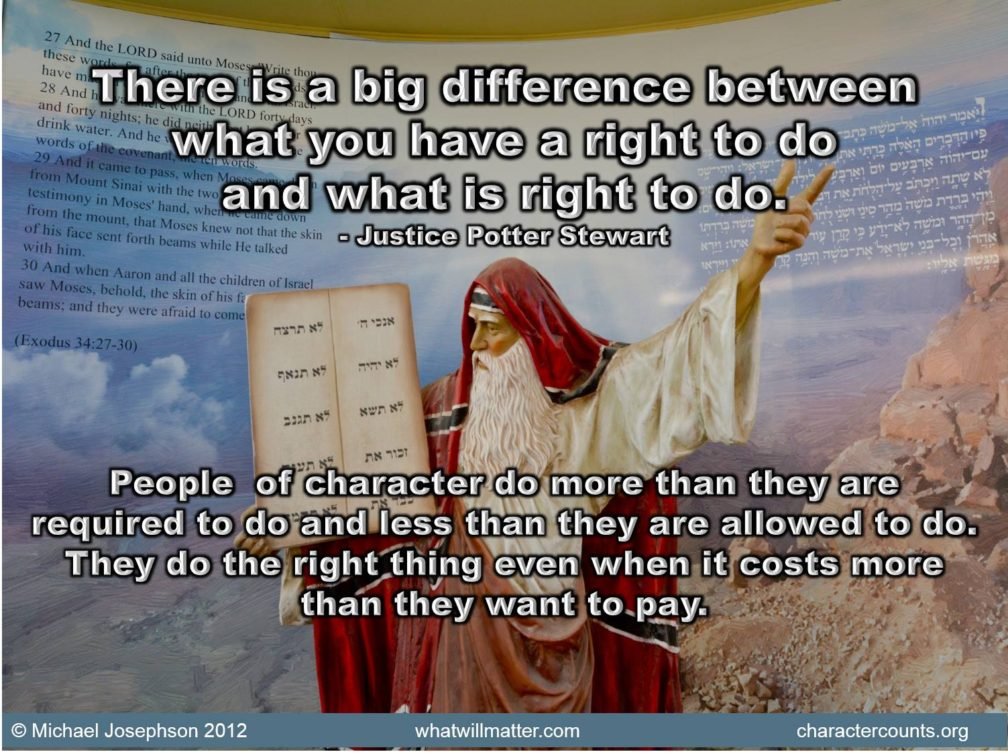– Legal versus Ethical, Permissible versus Proper — There’s a big difference between what you have right to do and what is right to do. –
Does the concept of business ethics justify or
even require the pursuit of profit and self interest without regard to core ethical principles that govern our non business lives? Or more broadly, is all ethics contextual? Are the moral rules for gaining and retaining power different for politicians. Is there a duty in sports to achieve victory that allows coaches and athletes to play by different ethical rules? Answering these questions reveals a gap between the “is” (what people really think and do) and the “ought” (what basic moral principles say about what we ought to think and do).
Despite self-serving and self-justifying claims to the contrary, the concepts of personal and corporate responsibility are real and important. While the application of ethical principles may be contextual (e.g., the “situation” is relevant to what is fair or respectful or how to demonstrate responsibility or caring), the ethical principles themselves are not. An ethical person, a person of good character, demonstrates integrity, respect, responsibility, fairness, caring and good citizenship in all contexts. Greed is not good.
The poster above articulates the moral truth:
ETHICS IS A GROUND A RULE, NOT AN OPTION. The crucial question is not whether an act is permissible, but IS IT PROPER? Not whether it is legal, but IS IT RIGHT? People of character know the difference between what they have a right to do and what is right to do; they often do more than what’s required and less than what’s allowed.
Yet we hear in business, politics and sports the excuse: “Everything I did was legal. Blame the law, not me.” From an ethical perspective, this claim is a nonstarter.
The law tells us what is prohibited or required. It doesn’t tell us what is right and proper. Those are moral questions we are all accountable to ask and answer. Imagine a society where everyone did everything they had a right to do and only what they were required to do. There would be no kindness, generosity, charity or respect. There would be no personal restraint on the use of power or authority. Ultimately, to assure a civil society we would need volumes and volumes of laws.
Some seem to believe that when we are engaged in commerce, the pursuit of profit is the only pertinent consideration, that the only moral principle in business is the obligation to ourselves and family, our business and our employees is to maximize financial gain. This principle justifies treating what some call civic responsibilities as burdens to be avoided and minimized to the greatest extent possible.
Though the blindly self-serving view of business that “greed is good” popularized by Gordon Gekko the old movie “Wall Street” (https://www.youtube.com/watch?v=PF_iorX_MAw), has some very prominent advocates, it is morally hollow. But this “look out for number one” philosophy is not only ethically unworthy, it is also incredibly short-sighted and ultimately self-defeating.
Personal and Corporate Responsibility
And though there are plenty of examples of this cynical and essentially selfish perspective, most recently in the flagrant illegal and immoral moral actions at Volkswagen and Wells Fargo, no public company today overtly espouses and most do not pursue a profit only perspective. Instead, it is widely accepted that businesses have moral duties to a wide range of stakeholders including consumers, vendors and the general public. This has given rise to the concept of Corporate Social Responsibility (CSR) defined succintly in Wikipedia as:
“a form of corporate self-regulation integrated into a business model. CSR policy functions as a self-regulatory mechanism whereby a business monitors and ensures its active compliance with the spirit of the law, ethical standards and national or international norms. With some models, a firm’s implementation of CSR goes beyond compliance and engages in “actions that appear to further some social good, beyond the interests of the firm and that which is required by law.”
For some, the concept is simply a sincerely noble and uplifting way to look at a business enterprise, for others, it is just a strategy to better achieve profitability by increasing trust and loyalty and avoiding resource draining and reputation-damaging lawsuits and scandals. See “Why CSR? The Benefits Of Corporate Social Responsibility Will Move You To Act” http://www.forbes.com/sites/devinthorpe/2013/05/18/why-csr-the-benefits-of-corporate-social-responsibility-will-move-you-to-act/#49fdb12f5e1c.
Regardless of the motive, anyone who claims a fiduciary obligation to use every possible means to maximize profits without regard for the collateral consequences is adhering to a primitive and discredited theory masking socially irresponsible selfishness. There is both a personal and corporate responsibility to do ones share, to pay ones share and to moderate selfishness.
– Michael Josephson (Revised Dec. 31, 2016)
Please return to home page www.josephsononbusinessethics.org to bwose other articles you might find interesting and subscribe to our free monthly newsletter.

